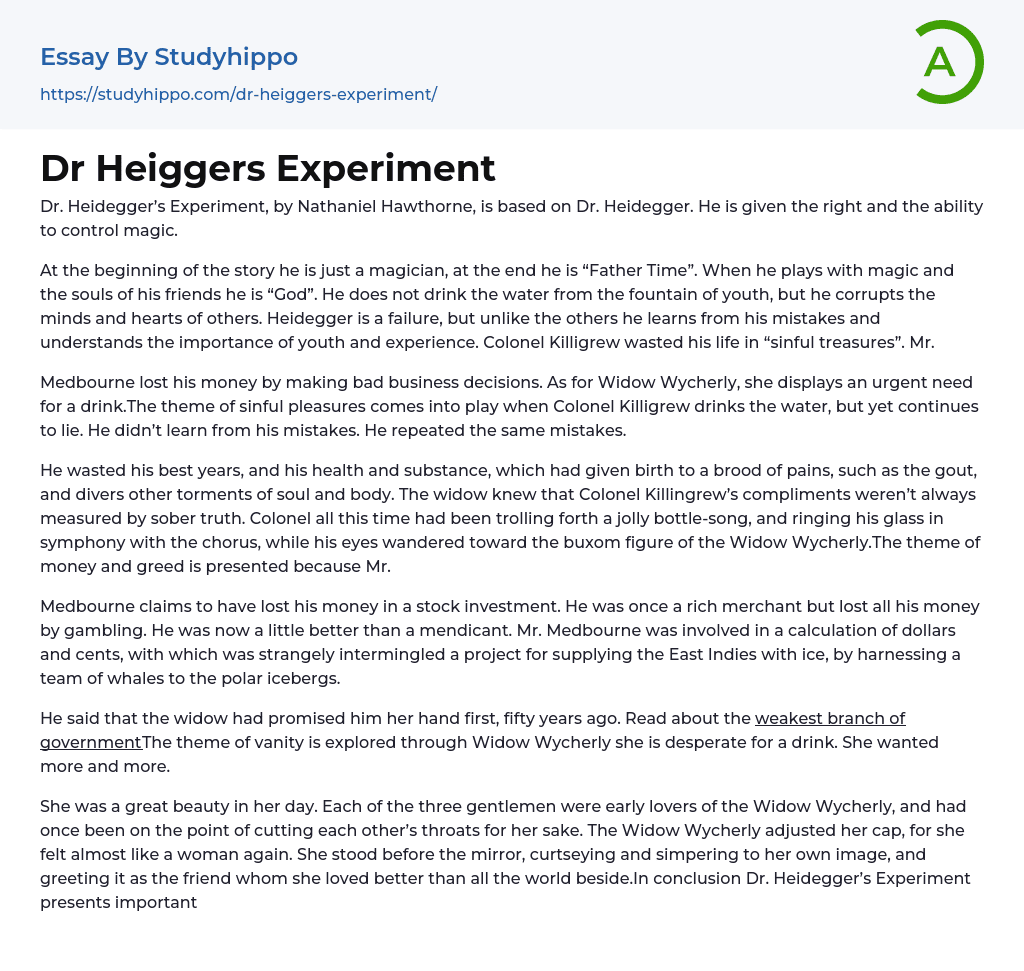The capability to control magic lies with Dr. Heidegger in Nathaniel Hawthorne's "Dr. Heidegger's Experiment."
Initially, he dazzles audiences with illusions and identifies as a magician. Over time, his magical prowess and ability to sway others' spirits earn him the moniker "Father Time", with some even likening him to a god. Rather than consume the fountain of youth, he employs his abilities to control those around him. Despite Heidegger's shortcomings, he recognizes the significance of both youthful energy and mature wisdom through learning from his missteps. Meanwhile, Colonel Killigrew recklessly indulges in sinful pleasures while Mr.
Medbourne's poor business decisions led to his financial loss. Widow Wycherly exhibits a strong desire for alcohol. The theme of sinful indulgences surfaces when Colonel Killigrew consumes water but persists in lying, failing to learn from his previ
...ous mistakes and repeating them.
The Widow Wycherly was aware of Colonel Killingrew's tendency to exaggerate when complimenting others. She also knew that he had suffered from various physical and emotional pains due to his reckless lifestyle and poor health. Despite this, he continued to sing and drink with enthusiasm, admiring the buxom figure of the widow. The text introduces the theme of money and greed through the mention of Mr.'s wasteful behavior and loss of health and wealth.
Despite being a former wealthy merchant, Medbourne now lives as little more than a beggar due to losing all his money through gambling and a failed stock investment. Currently, he is preoccupied with a financial calculation involving dollars and cents, as well as a wild scheme to transport ice to the East Indies using whales to harness polar icebergs.
According to him, fifty years ago, the
widow had promised him her hand first. The concept of the weakest branch of government is also discussed. The character of Widow Wycherly exemplifies the theme of vanity, as she persistently craves a drink and desires more and more.
Dr. Heidegger’s Experiment highlights the concept of life through the story of the Widow Wycherly, a former beauty who was courted by three men willing to fight for her affection. As she admires her image in the mirror, the widow reminisces about her past and feels youthful again. Ultimately, the text offers significant thoughts on the meaning of life.
Within the text, it becomes clear that the trio of men embody those present in our everyday lives. While some individuals seize the opportunity to evolve and learn from their previous blunders, others disregard their past and avoid personal growth altogether.
- Book Summary essays
- Metaphor essays
- Reader essays
- Rhyme essays
- Literary devices essays
- Villain essays
- Books essays
- Genre essays
- Literary Criticism essays
- Writer essays
- Protagonist essays
- Simile essays
- Poem essays
- Book Report essays
- Book Review essays
- Greek Mythology essays
- Plot essays
- Tragic Hero essays
- Coming of Age essays
- Play essays
- Rhetoric essays
- Rhetorical Question essays
- Translation essays
- Understanding essays
- Reason essays
- Character essays
- Letter essays
- American Literature essays
- Literature Review essays
- Utopia essays
- Poetry Analysis essays
- Dante's Inferno essays
- Between The World and Me essays
- Incidents in The Life of a Slave Girl essays
- Flowers for Algernon essays
- Myth essays
- Everyday Use essays
- Boo Radley essays
- Genesis essays
- Richard iii essays
- Alice in Wonderland essays
- On the road essays
- Ozymandias essays
- The Nightingale essays
- Holden Caulfield essays
- Animal Farm essays
- 1984 essays
- A Hanging essays
- Shooting An Elephant essays
- A Tale Of Two Cities essays




